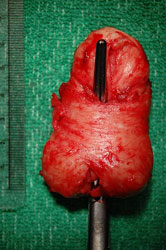Preventing prostate cancer cells from 'bodybuilding' provides new treatment hope

Prostate cancer is partly driven by cell signals from the androgen receptor (AR) protein AR. One gene regulated by AR's signals is the well-known prostate cancer biomarker, Prostate Specific Antigen (PSA). However, the full network of genes controlled in this way is not yet known.
Scientists from Cancer Research UK's Cambridge Research Institute at the University of Cambridge searched through the DNA in prostate cancer cells to identify genes controlled by AR and find new potential ways to detect and treat the disease.
Other genes were also mainly linked to metabolism
The team identified a number of AR-controlled genes, including the gene that codes for the enzyme CAMKK2*** which controls glucose consumption in cells.
The other genes were also mainly linked to metabolism - the generation of energy, and controlled cancer cells' ability to absorb glucose. High levels of glucose are required by cancer cells for growth and division and to power important 'construction' work to produce cellular building blocks - fats, proteins, DNA and RNA.
They discovered that there were unusually high levels of CAMKK2 in prostate cancer cells.
The team then showed in mice that stopping both the production and activity of CAMKK2, blocked the spread of prostate cancer cells and reduced the tumour size. Measuring levels of the enzyme could also be used as a 'biomarker' or test to detect prostate cancer.
Blocking genes to starve cancer cells
Lead author, Dr Ian Mills, said: "We've discovered a network of genes which control how prostate cancer cells 'bulk up' before they divide. Moreover, importantly we've shown that blocking one of these genes will starve the cancer cells of vital nutrients - and reduce tumour size and spread of the disease.
"More research to understand how prostate cancer cells generate energy could open up new routes to detect and treat the disease."
Prostate cancer is the most common cancer in men in the UK with around 37 000 cases diagnosed each year.
Dr Lesley Walker, Cancer Research UK's director of cancer information, said: "Cancer Research UK is a major funder of research into prostate cancer in the UK - transforming our understanding of the disease and how best to detect and treat it.
"And this important study shows that investigating the way prostate cancer cells use and generate energy could provide a promising new route to search for ways to detect and treat different stages of the disease, to continue to improve survival from prostate cancer in the future."
Source: Cancer Research UK


























